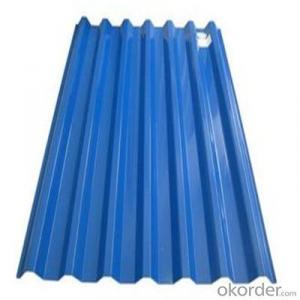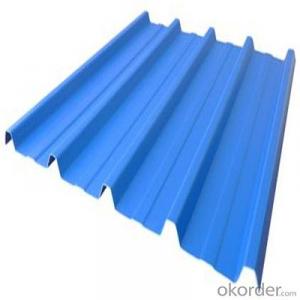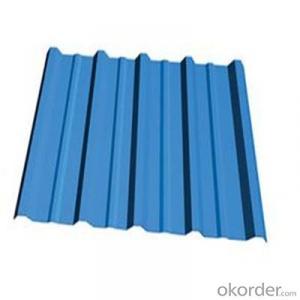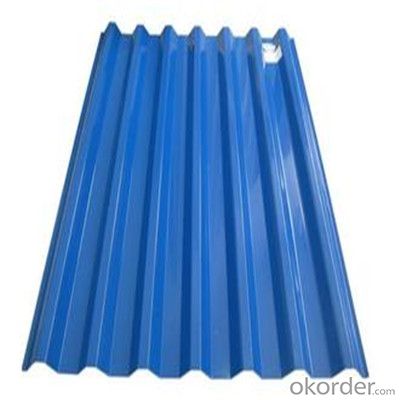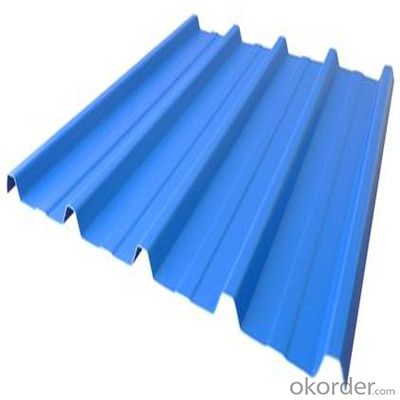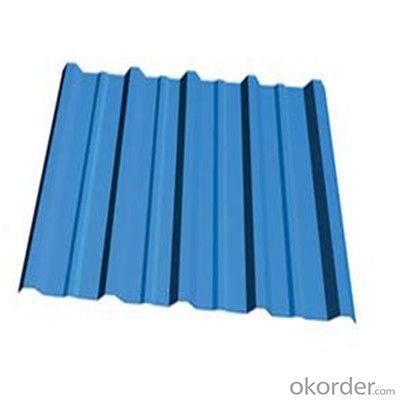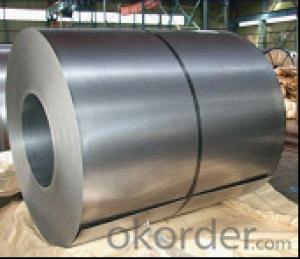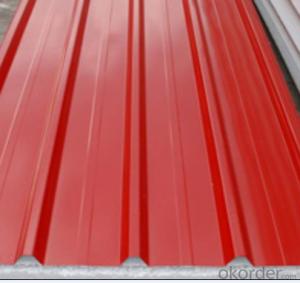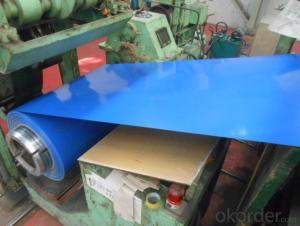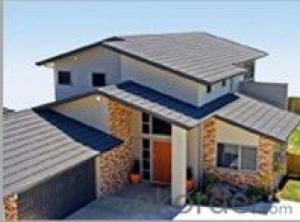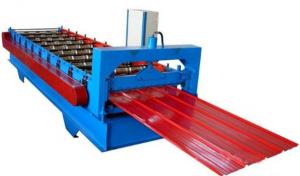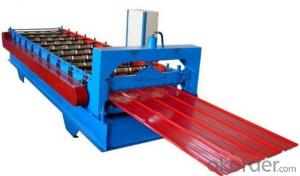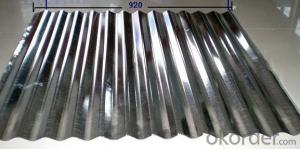Prepaint Galvanized Corrugated Iron Sheets
- Loading Port:
- Tianjin
- Payment Terms:
- TT OR LC
- Min Order Qty:
- 100 m.t.
- Supply Capability:
- 1000345 m.t./month
OKorder Service Pledge
OKorder Financial Service
You Might Also Like
Specification
Description of Corrugated Iron Sheet:
Minimum yield strength of 550 MPa ensures required strength for roofing application
Accurate thickness, width and length gives a perfect fit for any roof
Wider valley ensures higher water discharge in case of heavy rains
Specifications of Corrugated Iron Sheet:
Material | Steel |
Color | All RAL color |
Thickness | 0.23-1.0MM |
Width | 600mm to1200mm |
Zinc coating | 80 to 275g m2 |
Certificate | ISO 9001:2000 |
Minimum Order Quantity: | 300 Square Meter/Square Meters |
Packaging Details: | plastic film and in bundles |
Delivery Time: | within 15 days |
Supply Ability: | 30,000 Square Meter/Square Meters per day |
Features of Corrugated Iron Sheet:
Raw material width 762mm, after corrugated width 665mm: 9 waves.
Raw material width 914mm ,after corrugated width 800mm:11 waves.
Raw material width 1000mm, after corrugated 890mm or 900mm :12 or 14 waves. as customer requirement
Images of Corrugated Iron Sheet:
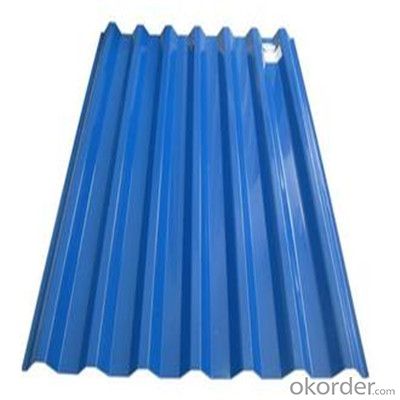
FAQ:
1. What's the Delivery port?
The main ports are Qingdao and Tianjin, we also can deliver to other ports to meet your requirements
2. How long is the lead time?
Delivery time: 45 days after order confirmed.
3. What payment term do you accept?
Payment: T/T or L/C at sight.
- Q: What are the different shapes available for steel sheets?
- There are several different shapes available for steel sheets, depending on the specific requirements and applications. Some of the commonly used shapes include: 1. Flat sheets: These are the most basic and versatile shape of steel sheets. They have a flat surface and are available in various sizes and thicknesses. Flat sheets are commonly used in construction, automotive, and manufacturing industries. 2. Coils: Steel sheets can also be available in coils, which are continuous lengths of sheet metal wound into a roll. Coils are often used for large-scale production processes, such as in the manufacturing of appliances, automobiles, and HVAC systems. 3. Perforated sheets: These sheets have evenly spaced holes or perforations throughout their surface. Perforated sheets are used in applications where ventilation, filtration, or aesthetic appeal is required, such as in architectural designs, signage, and industrial machinery. 4. Corrugated sheets: These sheets have a series of parallel ridges and grooves, which provide strength and rigidity. Corrugated sheets are commonly used for roofing and siding applications, as they offer excellent durability and weather resistance. 5. Expanded metal sheets: These sheets are manufactured by cutting and stretching a flat sheet, creating a pattern of diamond-shaped openings. Expanded metal sheets are used in applications that require ventilation, security, or filtration, such as fences, walkways, and machine guards. 6. Diamond plate sheets: Also known as tread plate or checker plate, these sheets have a pattern of raised diamonds or lines on their surface. Diamond plate sheets are commonly used for flooring, stairs, ramps, and truck bed liners, as they provide traction and slip resistance. These are just a few examples of the different shapes available for steel sheets. The choice of shape depends on the specific requirements of the project, including strength, durability, aesthetics, and functionality.
- Q: What is the typical fatigue strength of a steel sheet?
- The typical fatigue strength of a steel sheet can vary depending on various factors such as the grade of steel, manufacturing process, and the specific application. However, in general, the fatigue strength of a steel sheet is often around 50-70% of its ultimate tensile strength.
- Q: Can steel sheets be used for industrial machinery?
- Yes, steel sheets can be used for industrial machinery. Steel is a versatile and durable material that is commonly used in the manufacturing of various types of industrial machinery due to its strength, resistance to corrosion, and ability to withstand high temperatures and heavy loads. Steel sheets can be easily fabricated and shaped to meet specific requirements, making them suitable for a wide range of industrial applications.
- Q: What is the thermal conductivity of stainless steel sheets?
- The thermal conductivity of stainless steel sheets typically ranges from 14 to 19 watts per meter-kelvin (W/mK), depending on the specific grade and thickness of the sheets.
- Q: Are steel sheets suitable for manufacturing water pipes?
- Yes, steel sheets are suitable for manufacturing water pipes. Steel is a durable and strong material that can withstand high pressure and corrosion, making it an ideal choice for water pipes. Steel sheets can be easily formed and welded together to create seamless pipes that are resistant to leaks. Additionally, steel pipes have a long lifespan and require minimal maintenance, making them a cost-effective option for water pipe manufacturing.
- Q: How do steel sheets perform in extreme temperatures?
- Steel sheets generally perform well in extreme temperatures. Steel is known for its excellent heat resistance, allowing it to maintain its structural integrity and mechanical properties even when subjected to high or low temperatures. However, extreme temperatures can affect the strength and ductility of steel, causing it to become brittle at low temperatures and lose some of its load-bearing capacity at high temperatures. Therefore, the specific performance of steel sheets in extreme temperatures depends on factors such as the grade of steel used and the duration and intensity of the temperature exposure.
- Q: Can steel sheets be used in the food processing industry?
- Yes, steel sheets can be used in the food processing industry. Steel is a highly versatile and durable material that is commonly used in various applications in the food processing industry. Steel sheets are often used for constructing equipment and machinery such as tables, work surfaces, shelves, cabinets, and containers. Steel sheets have several properties that make them suitable for use in the food processing industry. Firstly, steel is resistant to corrosion, which is essential in an environment where food and liquids are constantly present. This resistance to corrosion ensures that the steel sheets maintain their structural integrity and do not contaminate the food being processed. Secondly, steel is easy to clean and sanitize, which is crucial in maintaining high standards of hygiene in the food processing industry. Steel sheets can be easily wiped clean, and their smooth surface prevents the accumulation of dirt, bacteria, and other contaminants that could potentially affect the quality and safety of the food. Additionally, steel sheets are strong and can withstand heavy loads and physical impacts. This makes them suitable for use in equipment and machinery that handle large quantities of food or require frequent movement or transportation. Moreover, steel is a non-porous material, meaning that it does not absorb or retain odors, flavors, or stains from the food being processed. This property ensures that the steel sheets do not affect the taste or quality of the food. In conclusion, steel sheets are commonly used in the food processing industry due to their durability, resistance to corrosion, ease of cleaning, and non-porous nature. They provide a reliable and hygienic solution for constructing equipment and machinery that is essential for food processing operations.
- Q: What are the different surface patterns available for steel sheets?
- There are several different surface patterns available for steel sheets, including smooth, diamond, textured, and brushed finishes.
- Q: Are steel sheets resistant to discoloration from sunlight?
- Yes, steel sheets are generally resistant to discoloration from sunlight.
- Q: Are steel sheets resistant to impact and abrasion?
- Yes, steel sheets are generally resistant to both impact and abrasion due to their high strength and durability.
Send your message to us
Prepaint Galvanized Corrugated Iron Sheets
- Loading Port:
- Tianjin
- Payment Terms:
- TT OR LC
- Min Order Qty:
- 100 m.t.
- Supply Capability:
- 1000345 m.t./month
OKorder Service Pledge
OKorder Financial Service
Similar products
Hot products
Hot Searches
Related keywords
